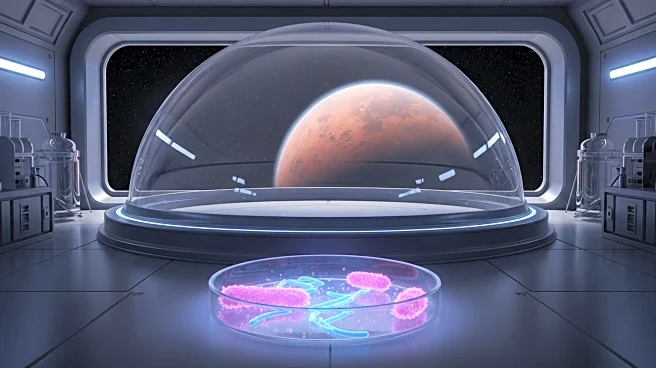What's Happening?
Researchers at RMIT University in Melbourne have conducted a groundbreaking study demonstrating that bacterial spores, specifically Bacillus subtilis, can withstand the extreme conditions of space travel. The study involved launching these spores aboard a sounding rocket, where they endured forces up to 13 times Earth's gravity during ascent and up to 30 times Earth's gravity during re-entry. Despite these harsh conditions, the bacteria maintained their structure and grew normally, indicating their potential to support astronaut health on extended space missions. This research is significant for future human missions to Mars, as the survival of beneficial bacteria is crucial for maintaining astronaut health during prolonged space travel.
Why It's Important?
The findings from this study are crucial for the future of long-term human missions to Mars, where microorganisms like Bacillus subtilis are considered critical biological support systems for sustaining human life. These bacteria could play a vital role in maintaining immune function, gut health, and blood circulation over decades-long missions. The study's insights into microbial survival limits could lead to biotechnology innovations on Earth, including the development of new antibacterial treatments and strategies to combat antibiotic-resistant bacteria. As we prepare for longer missions beyond Earth's orbit, ensuring the stability and functionality of microbial communities becomes increasingly important.
What's Next?
The success of Bacillus subtilis in surviving a real space launch provides a robust basis for further research. Future studies could explore the resilience of more delicate organisms, bringing humanity closer to establishing a sustainable and healthy presence on Mars. The research team is now seeking additional funding to expand life science experiments in microgravity environments, with the aim of advancing our understanding of microbial survival in space. Understanding how to protect and sustain beneficial microorganisms will be a critical component of mission planning as we look towards the future of human space exploration.
Beyond the Headlines
The study broadens our understanding of the effects of long-term spaceflight on microorganisms that inhabit humans and contribute to their health. Space travel presents numerous challenges to human health, with prolonged exposure to microgravity and space radiation being among the most significant. Ensuring the survival of beneficial bacteria is essential to mitigating these risks, as they play a key role in maintaining physiological functions and supporting the immune system. By proving that B. subtilis can endure the rigors of space travel, this study offers hope for the development of strategies to protect astronaut health on missions to Mars and beyond.









